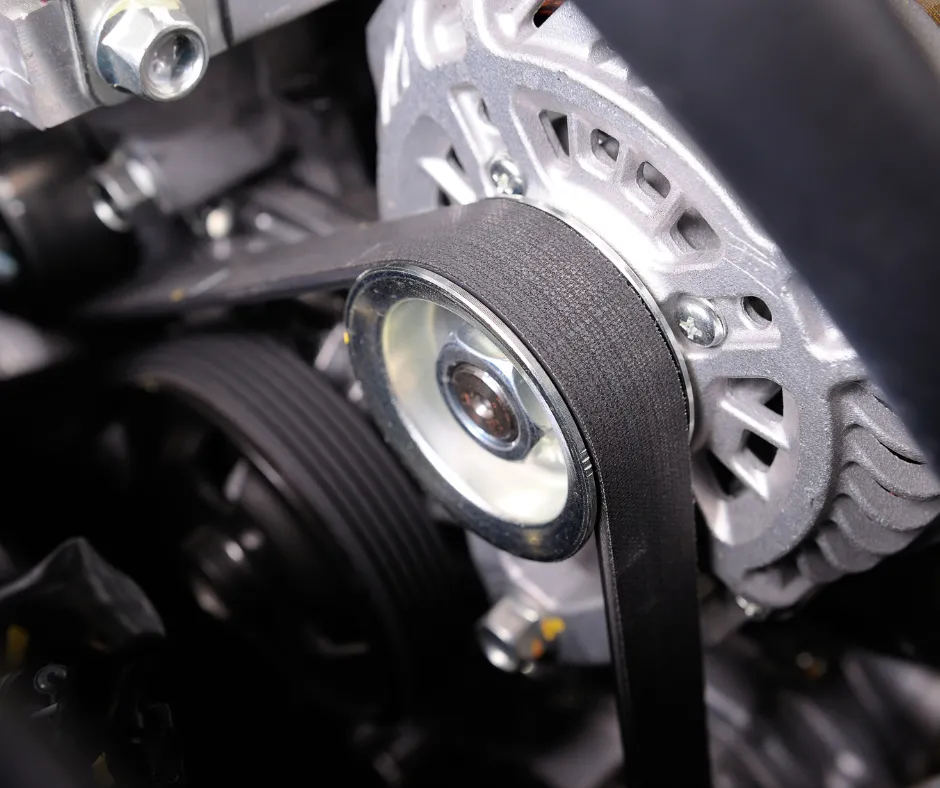Articles

Understanding the Importance of Timing Belt Replacement: Avoiding Costly Engine Damage
Maintaining your vehicle involves more than just regular oil changes and tire rotations. One crucial yet often overlooked component of your car’s engine is the timing belt. Understanding the importance of adjusting or replacing the timing belt, as needed, can save you from unexpected breakdowns and costly engine damage.
What is a Timing Belt?
The timing belt is a vital part of your car’s engine. It synchronizes the rotation of the crankshaft and camshaft, to ensure that the engine’s valves open and close at the correct times during each cylinder’s intake and exhaust strokes. This precise timing is vital for the engine to run smoothly and efficiently. To clarify; on average, a piston rotates between 12 and 100 times PER SECOND!
Why is Timing Belt Replacement Important?
1. Prevent Engine Damage
A worn-out timing belt can snap without warning, leading to severe engine damage—and a breakdown where/when it’s never convenient! When the timing belt breaks, there’s a good chance the valves and pistons hit each other, causing extensive damage that often requires a complete engine rebuild or replacement.
2. Maintain Engine Performance
Over time, the timing belt can stretch and lose its tension. This can lead to misalignment of the engine’s internal components, resulting in poor engine performance, reduced fuel efficiency, and increased emissions.
3. Avoid Costly Repairs
Replacing a timing belt is a relatively inexpensive maintenance procedure compared to the cost of repairing or replacing an engine damaged by a failed timing belt. Regular replacement according to your vehicle manufacturer’s recommendations can save you from unexpected and costly repairs.
When Should You Replace Your Timing Belt?
Most manufacturers recommend replacing the timing belt every 60,000 to 100,000 miles, but it’s essential to check your vehicle’s owner manual for specific guidelines for your vehicle. Other factors, such as the vehicle’s age, driving conditions, and the presence of oil leaks, can also affect the the lifespan of your timing belt.
Signs Your Timing Belt Needs Replacement
While it’s best to replace the timing belt according to the manufacturer’s schedule, here are some signs that indicate it might need replacement sooner:
Ticking Noise from the Engine: A ticking noise could indicate a worn timing belt.
Engine Misfires: If the timing belt slips, it can cause the engine to misfire.
Oil Leaks: Oil leaking onto the timing belt can damage the timing belt.
The timing belt is a critical component that plays a significant role in your engine’s performance and longevity. Regular replacement of the timing belt according to the manufacturer’s guidelines can prevent engine damage, maintain performance, and save you from costly repairs. Don’t wait for a problem to arise; ensure your timing belt is inspected and replaced as part of your regular vehicle maintenance routine.
If you need expert timing belt replacement, contact Your Mechanic today to schedule an appointment with one of our experienced technicians. We’ll keep your engine running smoothly and help you avoid costly repairs down the road.
Your Mechanic, in Camarillo, is a family-owned and operated business that has been serving the area for over 38 years. We pride ourselves on our honesty, integrity, and fair prices.
We offer a wide range of services, from simple oil changes to complex engine repairs. We’re located off the 101 between Central and Springville offramps. Call us today or come by our shop if you have questions about your timing belt or any other automotive concerns you might have.
Your Mechanic
270 N Aviador St #L
Camarillo, CA 93010
(805) 388-4933
www.YourMechanicCamarillo.com


